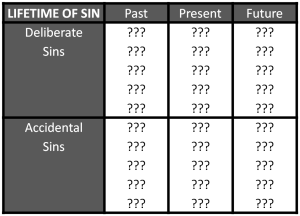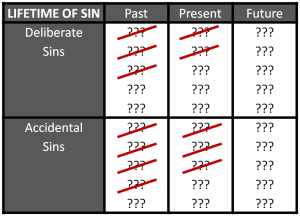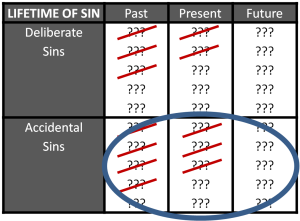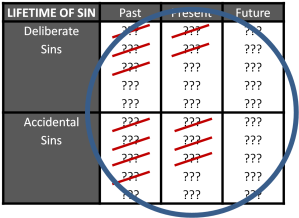 REPENTANCE IS NECESSARY
REPENTANCE IS NECESSARY
In order for a person to become a Christian, they need to have both FAITH and REPENTANCE…
Luke 13:3
“I tell you, no, but unless you repent, you will all likewise perish”.
Acts 2:38
And Peter said to them, “Repent, and let each of you be baptized in the name of Jesus Christ for the forgiveness of your sins; and you shall receive the gift of the Holy Spirit”.
Acts 17:30
“Therefore having overlooked the times of ignorance, God is now declaring to men that all everywhere should repent”.
HOWEVER MOST PEOPLE MISUNDERSTAND THE MEANING OF THE WORD ‘REPENT’.
Unfortunately, if you ask people to define the word ‘REPENT’, they will sometimes tell you that it means to ‘TURN MY LIFE AROUND’. And if by this they mean that the alcoholic has to stop being an alcoholic (or at least promise to stop being an alcoholic) before they can become a Christian, then there are all sorts of problems with this definition.
‘REPENT’ DOES NOT MEAN ‘TO TURN MY LIFE AROUND’…
There are at least 5 reasons why we can be sure that ‘repent’ does not mean ‘to turn my life around’…
1. If ‘repent’ means to ‘turn my life around’, how will I know if I’ve turned my life around enough?
Very few unbelievers would ever feel confident that they could turn their life around enough to become a Christian. And those who did feel confident would forever be questioning if they’ve done enough to maintain their new life.
2. The Bible teaches that repentance happens in our mind. Repentance will eventually lead to a ‘change of life’, but it does not mean a ‘change of life’.
Some things to consider…
A. THE GREEK WORD FOR ‘REPENT’ SIMPLY MEANS TO ‘CHANGE ONE’S MIND’.
> Some interpret ‘repent’ to mean that we need to ‘change one’s mind’ about Jesus.
That Jesus isn’t just a good teacher, a healer, a helper or a good person. But He is the Son of God, the Saviour who came to die for our sins and rise again. That He can be trusted to pay for our sin in full.
> Some interpret ‘repent’ to mean that we need to ‘change one’s mind’ about sin.
To agree with God that my sin is evil. That it destroys my relationship with God and others. That it destroys me. That I deserve judgement because of my sin.
Regardless of which interpretation one holds, most people would agree that becoming a Christian involves ‘changing one’s mind’ about both Jesus and sin.
B. THE BIBLE DISTINGUISHES BETWEEN ‘REPENTANCE’ AND THE ‘FRUIT OF REPENTANCE’.
John the Baptist called people to “produce fruit in keeping with repentance” (Luke 3:8). The Apostle Paul said: “I preached that they should repent and turn to God and prove their repentance by their deeds” (Acts 26:20).
Both these passages show that repentance is something that happens in the mind. It does not include actions. Actions will eventually flow as a result of repentance, but they are not part of repentance.
3. The Bible records several stories of people who were forgiven without having to turn their lives around.
Consider the following examples…
A. THE PHARISEE AND THE TAX COLLECTOR (LUKE 18:9-14)
To some who were confident of their own righteousness and looked down on everyone else, Jesus told this parable: “Two men went up to the temple to pray, one a Pharisee and the other a tax collector. The Pharisee stood by himself and prayed: ‘God, I thank you that I am not like other people—robbers, evildoers, adulterers—or even like this tax collector. I fast twice a week and give a tenth of all I get.’ “But the tax collector stood at a distance. He would not even look up to heaven, but beat his breast and said, ‘God, have mercy on me, a sinner.’ “I tell you that this man, rather than the other, went home justified before God. For all those who exalt themselves will be humbled, and those who humble themselves will be exalted.”
What we find…
> The tax collector did not ‘turn his life around’.
> He did not even promise to ‘turn his life around’.
> He simply acknowledged that he was a sinner under the judgement of God (repentance) and cried out for mercy (faith).
> As a result, Jesus said that the tax collector was justified (declared righteous) before God.
B. THE WOMAN CAUGHT IN ADULTERY (JOHN 8:3-11)
The teachers of the law and the Pharisees brought in a woman caught in adultery. They made her stand before the group and said to Jesus, “Teacher, this woman was caught in the act of adultery. In the Law Moses commanded us to stone such women. Now what do you say?” They were using this question as a trap, in order to have a basis for accusing him. But Jesus bent down and started to write on the ground with his finger. When they kept on questioning him, he straightened up and said to them, “Let any one of you who is without sin be the first to throw a stone at her.” Again he stooped down and wrote on the ground. At this, those who heard began to go away one at a time, the older ones first, until only Jesus was left, with the woman still standing there. Jesus straightened up and asked her, “Woman, where are they? Has no one condemned you?” “No one, sir,” she said. “Then neither do I condemn you,” Jesus declared. “Go now and leave your life of sin.”
What we find…
> The woman caught in adultery did not ‘turn her life around’.
> She did not even promise to ‘turn her life around’. We can be sure of this because if she had already decided in her heart to turn her life around, Jesus would not have needed to say ‘go now and leave your life of sin’.
> She did not even publicly acknowledge her sin. The assumption is though that while standing naked and exposed, she was more than aware that she was a sinner who deserved judgement (repentance) and looked to Jesus for mercy (faith).
> As a result, Jesus declared ‘neither do I condemn you’.
> Jesus called the woman to leave her life of sin as a response to His forgiveness, not as a prerequisite to His forgiveness.
C. THE CRIMINAL ON THE CROSS (LUKE 23:39-43)
One of the criminals who hung there hurled insults at him: “Aren’t you the Messiah? Save yourself and us!” But the other criminal rebuked him. “Don’t you fear God,” he said, “since you are under the same sentence? We are punished justly, for we are getting what our deeds deserve. But this man has done nothing wrong.” Then he said, “Jesus, remember me when you come into your kingdom.” Jesus answered him, “Truly I tell you, today you will be with me in paradise.”
What we find…
> The criminal did not ‘turn his life around’. He had no opportunity to do so before he died.
> He did not even promise to ‘turn his life around’. This would have been a ridiculous promise.
> He simply acknowledged that he was a sinner under the judgement of God (repentance) and cried out for mercy (faith).
> As a result, Jesus said that criminal would be with Him in paradise.
4. The purpose of the law is to drive us to Jesus by showing us that we are unable to turn our life around.
Before a person is willing to trust in Jesus to save them, they must first be convinced that they need saving. This is where the law comes in. As we try to obey God’s law, we become more and more aware of our inability to obey. The law exposes our sin and helplessness. It drives us to look for a saviour.
John Stott explains…
“The purpose of the law was, as it were, to lift the lid off man’s respectability and disclose what he is really like underneath – sinful, rebellious, guilty, under the judgement of God, and helpless to save himself”.
Martin Luther put it like this…
“What is this bruising and beating by the hand of the Law to accomplish? This, that we may find the way to grace. The Law is an usher to lead the way to grace. God is the God of the humble, the miserable, the afflicted. It is His nature to exalt the humble, to comfort the sorrowing, to heal the broken-hearted, to justify the sinners, and to save the condemned. The idea that a person can be holy by himself denies God the pleasure of saving sinners. God must therefore first take the sledge-hammer of the Law in His fists and smash the beast of self-righteousness and its brood of self-confidence, self-wisdom, self-righteousness, and self-help. When the conscience has been thoroughly frightened by the Law it welcomes the Gospel of grace with its message of a Saviour who came into the world, not to break the bruised reed, but to preach glad tidings to the poor, to heal the broken-hearted, and to grant forgiveness of sins to all the captives”.
Now if the law’s purpose is to convince us that the one thing we can’t do is obey, how could God possibly expect us to obey his commands as a requirement to becoming a Christian?
Repentance can’t mean ‘to turn our life around’. It can’t even mean to ‘promise to turn our life around’, for the law convinces us that this is a promise we can’t keep.
Repentance is not about bringing something to the table. It’s about realizing that we have nothing to bring to the table. That we are utterly helpless and hopeless before a Holy God, unable to save ourselves. It convinces us that we desperately need a saviour from both the power of sin and the consequences of sin.
5. The Bible teaches that without the Holy Spirit, it is impossible to turn our life around.
One of the most significant problems with thinking that repentance means ‘to turn our life around’ is that it contradicts what the Bible teaches about unbelievers being unable to please God.
Martin Luther explains…
“The following statements are therefore true: “Good works do not make a good man, but a good man does good works; evil works do not make a wicked man, but a wicked man does evil works.” Consequently it is always necessary that the substance or person himself be good before there can be any good works, and that good works follow and proceed from the good person, as Christ also says, “A good tree cannot bear evil fruit, nor can a bad tree bear good fruit” [Matt. 7:18]. It is clear that the fruits do not bear the tree and that the tree does not grow on the fruits, also that, on the contrary, the trees bear the fruits and the fruits grow on the trees. As it is necessary, therefore, that the trees exist before their fruits and the fruits do not make trees either good or bad, but rather as the trees are, so are the fruits they bear; so a man must first be good or wicked before he does a good or wicked work, and his works do not make him good or wicked, but he himself makes his works either good or wicked”.
What Luther is saying is that it’s impossible to produce good works until a person is first made a Christian.
Some would have concerns with Luther’s view. But the Bible makes it clear that “Without faith it is impossible to please God” (Hebrews 11:6). Jesus said: “I am the vine; you are the branches. If you remain in me and I in you, you will bear much fruit; apart from me you can do nothing” (John 15:5).
Therefore it is impossible for a person to ‘turn their life around’ before becoming a Christian. In fact, it’s only when a person becomes a Christian and receives the Holy Spirit that they have any hope of seeing their life turned around.
SHARE THIS ON FACEBOOK
 In his book “In the Grip of Grace”, Max Lucado tells the story of Billy Jack, a boy he met on a plane who needed extra care and attention.
In his book “In the Grip of Grace”, Max Lucado tells the story of Billy Jack, a boy he met on a plane who needed extra care and attention.






